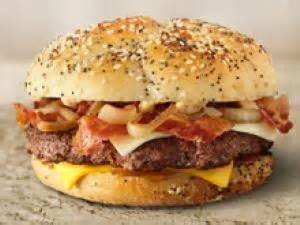 McDonald’s is bringing back its big burgers in the hope they will in turn bring back their customers. Starting in late April, the largest fast-food restaurant chain will for a short period bring back its beefier burgers in its restaurants in the U.S. that are akin to the Angus 1/3 pounders that two years ago were discontinued.
McDonald’s is bringing back its big burgers in the hope they will in turn bring back their customers. Starting in late April, the largest fast-food restaurant chain will for a short period bring back its beefier burgers in its restaurants in the U.S. that are akin to the Angus 1/3 pounders that two years ago were discontinued.
The company hopes that its customers that are budget conscious will hand over $4.99 per burger and that it will serve as a start to competing better against a growing number of premium burger competitors.
Franchises can charge the price they desire for these new burgers being tested. This move comes as Steve Esterbrook the new CEO pledged to make the restaurant a progressive, modern burger business.
One big part in the challenge McDonald’s is facing is changing the bad impression customers have of the chain’s food. The company had tried to wean customers off the less expensive items it has, which it acknowledged has hurt the overall image of the restaurant by making it appear to be lower quality.
However, many customers at McDonald’s have budgets, making it difficult for the company to succeed with those changes.
McDonald’s dropped the Angus Third Pounders during 2013 after a run of four years when many customers complained that those burgers were too expensive. The new burgers, made from sirloin, will have the largest patties of any burger at McDonald’s and be available in three permutations.
To keep up with the changing behavior of the public and its tastes, McDonald’s has been testing all-day breakfast along with allowing diners to customize their burgers. It also is raising wages of 90,000 workers in company owned restaurants.
McDonald’s just reported comparable sales for the U.S. dropped 4% during February. It faulted more competition, which illustrates it urgency for the bigger hamburger.
